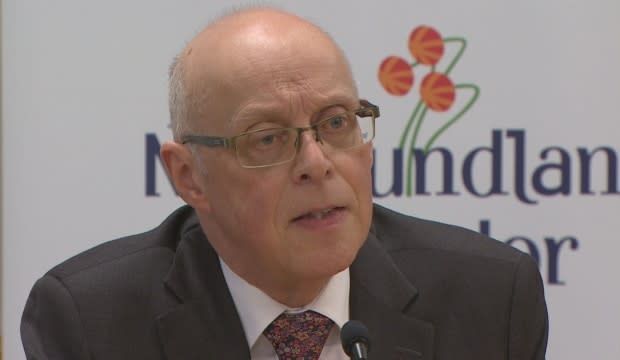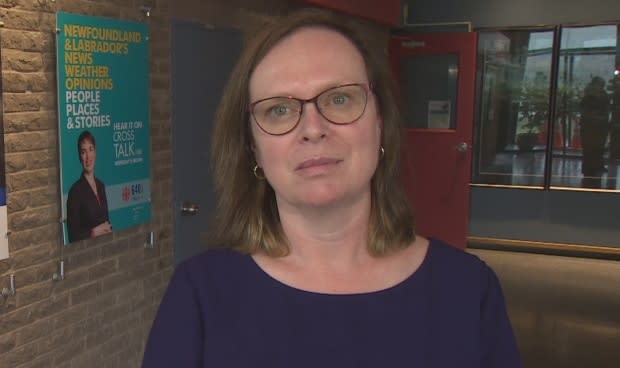Thousands in N.L. without family doctor 'challenging,' says health minister
The provincial Progressive Conservatives are calling the growing number of people in Newfoundland and Labrador without a family physician a crisis, but Health Minister John Haggie says it's not a new problem — and it's one he's working on.
Haggie met with the Newfoundland and Labrador Medical Association and the Nurse Practitioner Association on Tuesday to discuss strategies to alleviate the issue, after the released the results of a survey that suggested about one in five people in the province don't have a family doctor. That's roughly 99,000 people.
In places like Holyrood, residents are lamenting the retirement of their longtime family doctor, while being unable to find another family physician to take over their care.
"It's nothing in the way of a situation that's new. We manage those situations," Haggie said.
"We've put primary health-care teams in Burin, Bonavista and we're starting in Gander and Botwood. So there's work ongoing."
But PC MHA David Brazil criticized the province for not being able to retain doctors trained at Memorial University's school of medicine, saying the number of people in the province without a family doctor in the province is a crisis.
He said there needs to be better recruitment and salary to attract new doctors to the province and keep them here.

"There's a multitude of things here. It's not a one quick fix, there's a multifaceted approach. But if we put all our ducks in a line there's no reason why people would not have access to proper medical care anywhere in Newfoundland and Labrador," he said.
"We see more retiring than we're recruiting or retaining. There's some real challenges in our system here. It has to be rectified immediately because this is health we're talking about."
However, Haggie said the number of retained doctors out of MUN is actually increasing.
According to Haggie the province spends about $5 million on recruitment and retention of doctors annually, adding Eastern Health has 68 more family physicians now than in 2010.
What's more, Haggie said, information he received from MUN's faculty of medicine shows that 94 per cent of MUN family medicine residents are still practising in the province two years later.
Haggie said while it's certainly a situation that needs addressing he wouldn't call it a crisis.
Solutions vary by region: Haggie
"I think for those people who can't find a family physician in this area it's certainly a real challenge, and it's very distressing and I empathize with that," said Haggie, who was hired as a doctor in Central Newfoundland before he got into politics.
"I was once a solution to a doctor shortage in this province and that was 30 years ago," he said.
The way the province can go about fixing it will vary depending on the region, as well, he added, and his department is working with the NLMA after that organization put forward its 10-year vision.
Haggie said the way health services are delivered in both rural and urban areas is evolving alongside the modern needs of patients.
He added that Eastern Health will help in the short-term with new services while government develops a long-term strategy.
I don't want to create a new problem by adopting an old solution. - Health Minister John Haggie
The focus now, instead of on a single-physician family practice, is creating primary health-care teams, Haggie said.
"It's obviously a significant challenge for those people who are in this situation, and this reflects that transition from an old business model of primary care to our new, team-based approach," he said.
"The health-care system is in a period of flux, a period of change, where we're moving from an old model of primary-care business into team-based collaborative care where nurse practitioners, RNs, social workers, midwives and physicians all have a role to play and can overlap so that … the parts add up to something greater."
Haggie met with both the NLMA and the Newfoundland and Labrador Nurse Practitioners' Association on Tuesday in the ongoing discussions about the changing primary health-care system.
According to Charlene Fitzgerald, president of the NLMA, Haggie has agreed to use the committee made up of the NLMA and the Department of Health and Community Services to develop strategies to address the issue.
Committee meeting next week
The committee will be meeting next week to begin work.
Of the roughly 99,000 people across Newfoundland and Labrador who are without a doctor, Fitzgerald said short-term strategies will be developed on top of the imminent long-term strategies the committee will be developing.
"Family medicine is something that didn't deteriorate in a second, and it won't, unfortunately, be rebuilt in a second. It's going to take years before all of those people have regular, continuous, family doctors," Fitzgerald said.
"Ultimately it's the Department of Health and Community Services that's responsible for the provision of family doctors, and other doctors, to the province."

Fitzgerald said this problem has been brewing for a long time, and it's happening all over the province. For her, and the people who are seeking family doctors, she said, it's a crisis.
She said the NLMA receives calls all the time from people searching for family doctors. She added that family doctors' offices get up to 30 calls a day from people seeking their services.
The NLMA has brought in a consultant to have a look at where family physicians are practising, what they're doing and how many family physicians the province is going to need right now, in five years and in 10 years.
Fitzgerald said the results of those findings will be made available.
'Let us join in'
Nurse practitioners say they can be a key asset in making sure people are getting the care they need.
"We diagnose illness, we order blood work and diagnostic tests, we treat conditions, prescribe medications, and we also promote health," said Kirk Dawe, president of the association.
"We work independently under our own licence. We're not supervised by physicians, but we do work very closely with them. We collaborate with them, always in the best interests of our patients."
But, Dawe said, the province's current health-care system limits where NPs can practise.

"For example, the issues in Holyrood right now, currently there's no way for an NP to just go out there and set up shop, unless they were gonna directly bill the clients," he said.
"What we're asking for is some sort of mechanism so if someone's available they can go, start a practice and somehow bill the government so patients don't have to pay for those services."
Fellow NP Kari Brown, also on the association's board of directors, said working in an emergency room department has shown her just how many people resort to emergency care to fill the gaps left by a lack of family doctors.
"They end up enduring long waits in a busy crowded emergency department just to get basic health care, and I find that very unnecessary," she said.
"Here in Newfoundland and Labrador we have trained, capable nurse practitioners who are absolutely able to provide primary health care — we just need a way to do it.… Let us join in with the hard-working family physicians, let us set up shop beside them."
Changing delivery methods
That's an argument the association will bring up in ongoing discussions with Haggie's department, which is a step in the right direction, Brown said.
"Nurse practitioners have been noticeably absent from the discussion and we are really grateful for the chance to bring our voice forward," she said.
"We're right here, we're skilled, we're trained, we're licensed, and we want to be a part of the solution."
While Dawe and Brown said creating an avenue for NPs to bill the provincial Medical Care Plan is a possible solution, or even possibly setting up some sort of fee-for-service system for NPs.
I don't want to create a new problem by adopting an old solution. - John Haggie
But the fee-for-service system is something the NLMA wants to steer clear of, Haggie said, and move further away from as the primary-care models are changed.
"I don't want to create a new problem by adopting an old solution," Haggie said.
"There are all sorts of innovative ways of compensating practitioners, whether they are nurse practitioners, physicians, or midwives, for example, who we'll have entering the program in the province shortly, so I'm very conscious of looking forward and learning from the past rather than repeating it."
Read more from CBC Newfoundland and Labrador


